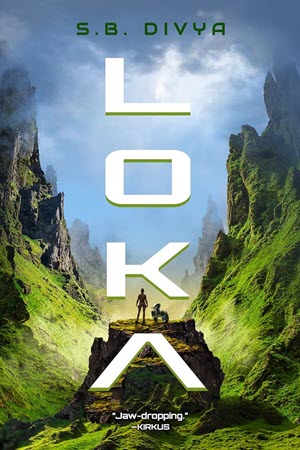Loka
 This book is a more-or-less direct sequel to Meru, though set some 16 years into the future. Some spoilers are inevitable, so if you have not read Meru yet you may want to look away.
This book is a more-or-less direct sequel to Meru, though set some 16 years into the future. Some spoilers are inevitable, so if you have not read Meru yet you may want to look away.
By the end of Meru, Jayanthri has succeeded in her quest to be allowed to open a colony on the planet for which the book is named. Jaya’s sickle cell condition makes her ideally suited for life on Meru, whereas baseline humans would struggle there. She and her partner, Vaha (an ‘alloy’, a type of sentient spaceship evolved from humans) have created a human child who shares Jaya’s unique genetics. Controversially, Jaya has also given her daughter some alloy genes which provide the child with chromatophores on her arm to allow her to speak the alloys’ sign language.
The new book, Loka, opens with young Akshaya on the cusp of adulthood. She has spent most of her life on a transport alloy called Chedi so that she could have human friends growing up. Her alloy genes are still a closely guarded secret. Being a typically rebellious teenager, Aks is furious that her mother designed her to live on Meru, a planet largely devoid of animal life. She desperately wants to see Earth, and all the amazing creatures that are reclaiming the planet now that the human population is under control.
Aks and her childhood best friend, Somya, discover something called the Anthro Challenge in which humans attempt to circumnavigate Earth using only human-era technology. Aks strikes a deal with her parents to the effect that, if she is able to complete the challenge, she will have proved her ability to survive on Earth and not have to go to Meru.
Being parents, Jaya and Vaha have entirely forgotten their own rebellious youth, and are terrified for their child. Seeking a way to keep tabs on the two teenagers during their journey, they strike a deal with a documentary film-maker, and allow called Nara. He agrees to provide regular updates to the worried parents in return for being allowed to make show about the youngsters’ travels. Parents can be very foolish.
On the face of it, Loka is a science fiction re-telling of Around the World in 80 Days, with Aks and Somya facing peril (both natural and human) as they race to complete the challenge before Chedi is due back at Earth to pick them up. But, as I mentioned in my review of Meru, SB Divya is an author who uses science fiction to examine interesting questions. The new book is no exception, and it is those questions that I would like to focus on.
By the way, Loka is the name given to the alloy-managed part of Earth where most humans live. There are also areas known as OOB – Out of Bounds – which are not alloy-managed and which have become home to humans who resent the benevolent dictatorship of the alloys. The Anthro Challenge requires travel to include time in the OOB.
Loka is a book that is primarily about personal autonomy in three different ways. Firstly there is the right of Aks to determine her own path through life and not be bound by her parents’ ambitions for her. Secondly there is the right of humans to have adventures such as the Anthro Challenge, even though this might pose a cost to society and cause a small amount of environmental damage. Finally there is the right of humans to evolve by acquiring alloy genes.
While Aks and Somya initially admire the people of Earth, especially the Out of Bounders, for living on an actual planet rather than in a very safe environment such as travelling on Chedi, they soon find out that the Earthlings are deeply conservative. While their travels are done in a very environmentally conscious way (primarily by solar-powered bikes and sailboats), they are seen as unnecessary adventurism and probable evidence of Aspiration and Avarice Disorder, the mental illness that almost led to the destruction of Earth’s environment in times past.
As for the alloy genes, it is inevitable that a media-savvy operator like Nara will discover Aks’ secret, and reveal it to the public at a time intended to cause maximum outrage.
Before this, however, the documentary series results in two other major political movements. Firstly the humans of Earth decide that the Anthro Challenge needs to be banned before any other reckless teenagers can get daft ideas. In addition, because Nara grounds the narrative in the story of Jaya and Vaha, the show leads to a movement amongst alloys to scale back some of the more cruel punishments for social deviance. Those of you who have read Meru may remember that the conservative alloy, Pushkara, and his unwitting dupe, Kaliyu, have been condemned to exile for their part in attempting to sabotage Jaya and Vaha’s mission to Meru.
While Aks and Somya don’t want the Challenge to be banned, they become very much aware that a significant part of alloy society is heavily invested in their story because it is providing fuel for the anti-exile campaign.
All of this gives us plenty to think about while we follow Aks and Somya on their journey. There is a certain amount of personal growth that they go through as well, not to mention some genuine peril caused by Earth’s weather, but that by itself would have made for a dull book. The sort of philosophical debate that Divya indulges in is all too rare in science fiction these days. I for one am grateful that she’s around to do it.

Title: Loka
By: S B Divya
Publisher: 47North
Purchase links:
Amazon UK
Amazon US
Bookshop.org UK
See here for information about buying books though Salon Futura